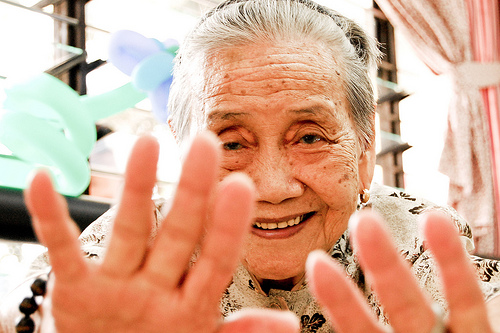OU News
News from The Open University
- Home
- ‘Understanding vision impairment is more imperative than ever’
‘Understanding vision impairment is more imperative than ever’
Posted on • Health

Older people with Vision Impairment (VI) from Black and Asian Minority Ethnic (BAME) groups in England are less likely to access vital support services than those from White British backgrounds, a recent study by The Open University (OU) has concluded.
The research, commissioned by the national sight loss charity, Thomas Pocklington Trust, interviewed 50 older people (aged 69 to 99) from BAME and White British backgrounds living across England.
To understand the impact of this study, two of the academics from the research team in the School of Health, Wellbeing and Social Care; Emeritus Professor Sheila Peace and Dr Jeanne Katz explain…
Why is research into vision impairment in older people so important?
Sheila:
The UK is an ageing society; by 2040, nearly one in four of the population will be over 65. As people age, their likelihood of suffering from eye conditions such as cataracts, glaucoma, macular degeneration and diabetic retinopathy increases; all of which cause VI, which can be extremely debilitating.
With two million people in the UK suffering from VI, particularly older people, it is imperative that we develop support services that are sensitive to the specific needs of VI people over 65, from both BAME and White British backgrounds.
How does vision impairment impact on the lives of older people?
Sheila:
Most participants attribute a reduction in their levels of independence to the gradual or sudden loss of sight. Nearly all of the participants value socialising and, for those who were previously able to drive, their experience of a loss of independence is particularly difficult. As over 50 per cent of those interviewed were living alone, the potential for becoming isolated as a result of VI and other health issues is high without the support of family and friends (particularly true for those from BAME backgrounds), or access to a support network in their community.
What differences are there between those from BAME and White British backgrounds?
Jeanne:
The most challenging aspect for older people with VI whose first language is not English is communication and understanding the support that is available to them in their locality. Many of the 18 BAME participants are not aware of the existence of, or comfortable attending, local support groups as a result of cultural or language barriers.
“People from White British backgrounds are generally confident in attending established centres independently, particularly if there are additional services in place such as transport to the venue. However, those from BAME backgrounds often require a representative from their community able to act as a translator or mediator to ensure services are accessible to them. Specific BAME networks and groups for VI people are crucially important to some BAME participants.
Sheila:
It is important to mention that those from BAME backgrounds are more likely to have cultural groups and relatives to lean on for support.
What will change as a result of your research?
Sheila:
Our aim has been to encourage community workers, healthcare professionals, and local occupational services to consider the specific requirements of all older people suffering from VI. These are individuals who want to maintain as much independence as they are able, and want to remain in their choice of home and their community.
Jeanne:
I am hopeful that the research will firstly raise awareness of the needs of older people with VI and secondly, recognise that many people experiencing VI have complex needs including other disabilities and illnesses, making living and social environments that much more challenging.
For me, the biggest issue is that the services and support available to those with VI vastly differs depending on where you are in the UK; if you have VI, it is very hit and miss as to whether you will be living in an area with excellent services to support you, or hardly any!”
For the full report entitled: Understanding the Lives of Older People with Vision Impairment, and Research Findings (53) document visit Thomas Pocklington Trust website.
Photo by fechi fajardo 